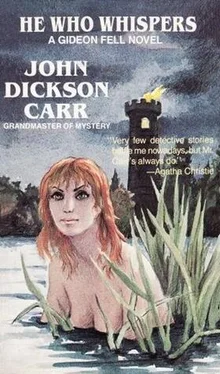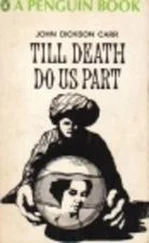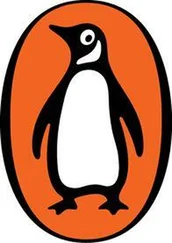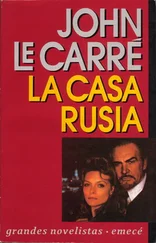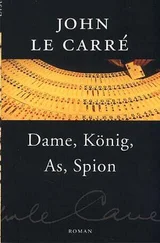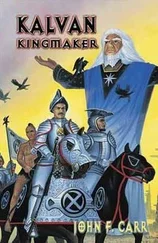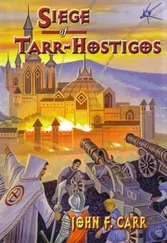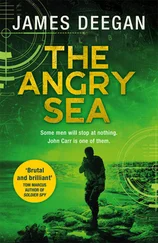Here Dr. Fell bent forward with great earnestness.
“now for a point which isn't mentioned by Rigaud or in the official records. It isn't mentioned because nobody bothered with it. Nobody thought it was important. The only person who has mentioned it is Fay Seton, though she wasn't there when it happened and couldn't have known it at all unless she had special reason for knowing.
“But this is what she told Miles Hammond last night. She said that, when Harry Brooke left the house in pursuit of Mr. Brooke, Harry Brooke snatched up his raincoat.”
Dr. Fell glanced over at Miles.
“You remember that, my boy?”
“Yes,” said Miles, conquering a shaky throat. “But why shouldn't Harry have taken a raincoat? After all, it was a drizzling day!”
Dr. Fell waved him to silence.
“Professor Rigaud,” Dr. Fell continued, “followed both father and son to the tower some considerable time afterwards. At the door of the tower, unexpectedly, he met Fay Seton.
“The girl told him that Harry and Mr. Broke were upstairs on top of the tower, having an argument. She declared she hadn't heard a word what father and son were saying; but her eyes, testifies Rigaud, were the eyes of one who remembers a horrible experience. She said she wouldn't interrupt at that moment, and in a frantic state of agitation she ran away.
“On top of the tower Rigaud found Harry and his father, also very agitated. Both were pale and worked up. Harry seemed to be pleading, while his father demanded to be allowed to attend to 'this situation'--whatever it was—in his own way, and harshly told Rigaud to take Harry away.
“At this time Harry certainly wore no raincoat; he was hatless and coatless, in a corduroy suit described by Rigaud. The sword-stick, untouched with blade screwed into sheath, rested against the parapet. So did the brief-case, but for some reason it had become a bulging brief-case.
“That extraordinary word struck me when I first read the manuscript.
“Bulging!
“Now the brief-case certainly hadn't been like that when Howard Brooke showed its contents to Rigaud at the Credit Lyonnais. Inside, in 'solitary state'--I quote Rigaud's own words—were four slender packets of banknotes. Nothing else! But now, when Rigaud and Harry left Mr. Brooke alone on the tower, there was something stuffed away inside it . . .
“Look here!” added Dr. Fell.
And he held up the yellow sword-cane.
Treating it with extraordinary care, he unscrewed the handle, took the thin blade from the hollow stick, and held it up.
“This weapon,” he said, “was found after the murder of Mr. Brooke lying in two halves: the blade near the victim's foot, the sheath rolled away against the parapet. The two halves were not joined until long afterwards days after the murder. The police took them away, for expert examination, just as they were found.
“In other words,” explained Dr. Fell with thunderous fierceness, “They were not joined together until long after the blood had dried. Yet there are stains of blood inside the scabbard. O tempora! O mores! Doesn't that mean anything to you?”
Raising his eyebrows in hideous pantomime, Dr. Fell peered round at his companions as though urging them on.
“I've got a horrible half-idea I do know what you mean!” cried Barbara. “But I—I don't quite see it yet. All I can think of is . . .”
“Is what?” asked Dr. Fell.
“Is Mr. Brooke,” said Barbara. “Walking out of the house after he'd read Harry's letter. Walking slowly towards the tower. Trying to realize what his son had done. Trying to make up his mind what to do.”
“Yes,” Dr. Fell said quietly. “Let us follow him.
“Harry Brooke, I dare swear, must have felt a trifle sick when he learned from his mother about Mr. Brooke's unexpected return home. Harry remembered his own unfinished letter lying upstairs, where Mr. Brooke had just been. Had the old man read it? That was the important point. So Harry put on a raincoat—let's believe he did—and rand out after his father.
“He reached the tower. He found that Mr. Brooke, for that solitude we want when we're hurt, had climbed up to the top. Harry followed him there. One look at his father's face, in that dark, windy, drizzling light, must have shown him that Howard Brooke knew everything.
“Mr. Brooke would hardly have been slow to pour out what he had just learned. And Fay Seton, on the stairs, heard the whole thing.
“She had returned from her stroll northwards along the river-bank, as she tells us, about half-past three. She had not yet gone in for a swim; her costume was still over her arm. She wandered into the tower. She heard frantic voices coming from above. And softly, on her openwork rubber-soled sandals, she crept up the stairs.
“Fay Seton, poised on that curving staircase in the gloom, not only heard but saw everything that went on. She saw Harry and his father, each wearing a raincoat. She saw the yellow cane propped against the parapet, the brief-case lying on the floor, while Howard Brooke gesticulated.
“What wild recrimination did the father pour out then? Did he threaten to disown Harry? Possibly. Did he swear that Harry should never see Paris or painting as long as his life lasted? Probably. Did he repeat, with a kind of incredulous disgust, all that beautiful Harry had done against the reputation of the girl who was in love with him? Almost certainly.
“And Fay Seton heard it.
“But sick as that must have made her, she was to hear and see worse.
“For such scenes sometimes get out of control. This one did. The father suddenly turned away, past speech; turned his back on Harry as he was to do later. Harry saw the ruin of all his plans. He saw no soft life for himself now. And something snapped in his head. In a child's fury he snatched up the sword-stick, twisted it out of its scabbard, and stabbed his father through the back.”
Dr. Fell, uneasy through all his bulk at his own words, fitted together the two halves of the sword-stick. Then he put it down quietly on the floor.
Neither Barbara nor Miles nor Professor Rigaud spoke, during a silence while you might have counted ten. Miles slowly rose to his feet. The torpor was leaving him. Gradually he saw . . .
“The blow,” Miles said, “was struck just then?”
“Yes. The blow was struck just then.”
“And the time?”
“The time,” returned Dr. Fell, “was nearly ten minutes to four. Professor Rigaud there was very close to the tower.
“The wound made by the blade was a deep, thin wound: the sort, we find in medical jurisprudence, that makes the victim think he is not at all badly hurt. Howard Brooke saw his son standing there white-faced and stupid, hardly realizing what he had done. What were the father's reactions to all this? If you know men like Mr. Brooke, you can prophesy exactly.
“Fay Seton, silent and unseen, had fled down the stairs. In the doorway she met Rigaud and ran from him. And Rigaud, hearing the voices upstairs, put his head inside the tower and shouted up to them.
“In his narrative Rigaud tells us that the voices stopped instantly. By thunder, they did!
“For, let me repeat, what were Howard Brooke's feelings about all this? He had just heard the hail of a family friend, Rigaud, who will be up those stairs as soon as a stout man can climb them. Was Mr. Brooke's instinct, in the middle of this awkward mess, to denounce Harry? Lord of all domestic troubles, no! Just the opposite! His immediate desperate wish was to hush things up, to pretend somehow that nothing at all had happened.
“I think it was the father who snarled to the son: 'Give me your raincoat!' And I am sure it was quite natural for him to do so.
Читать дальше
